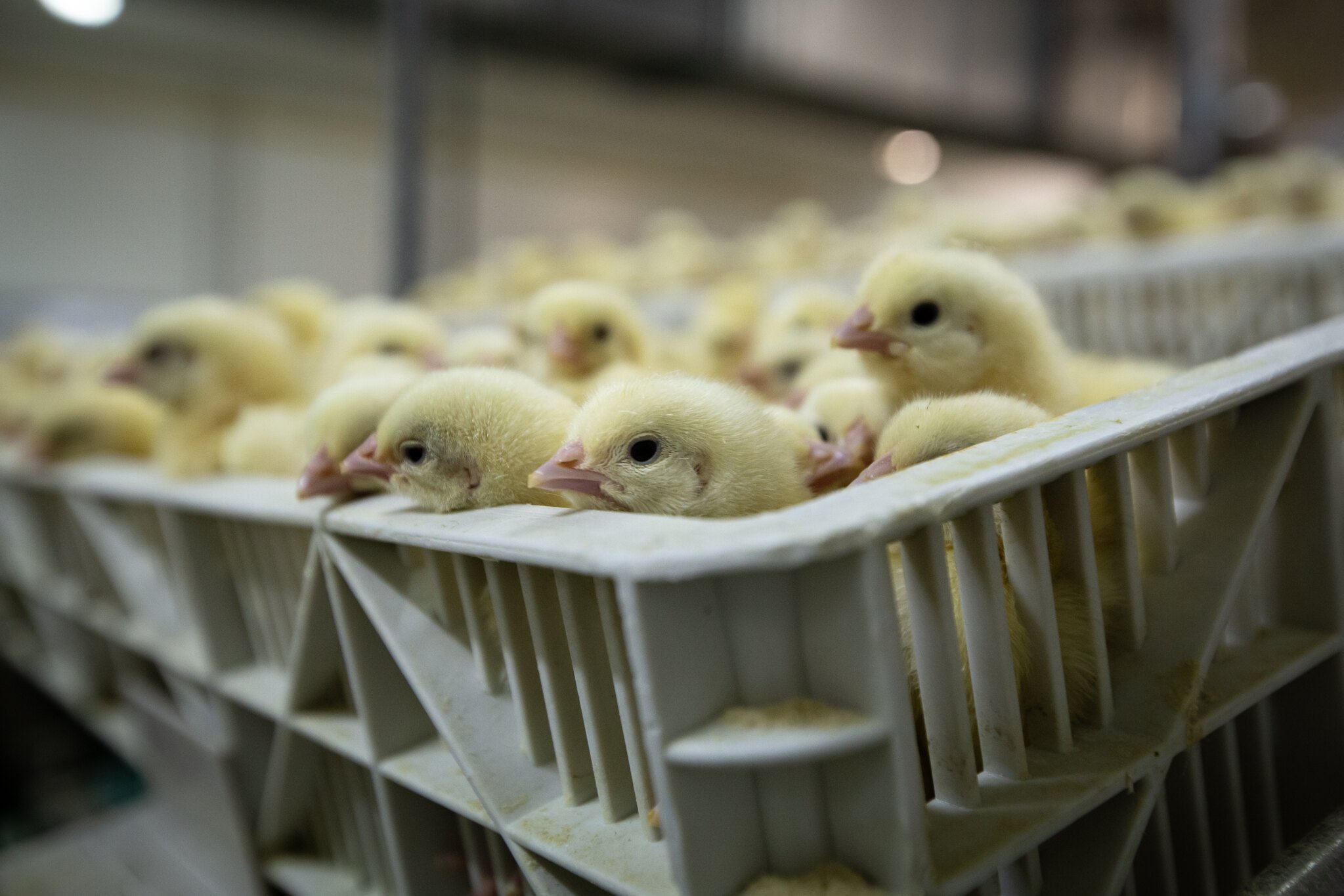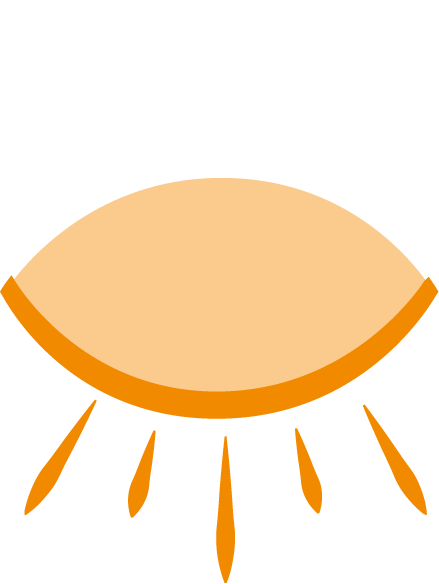
Education / The Bodhi Project / Chickens
Chickens in the Egg Industry

Day old chicks being sorted by gender at a hatchery - a facility where fertile eggs from either broiler breed or egg laying chickens are incubated and hatched into chicks, which are then raised to supply the egg and meat industry - the chicks that are identified as males are immediately culled by the hundred thousands via live maceration or suffocation. - European Union, Photo: human.cruelties
Content warning: The following images may be disturbing.
Click to reveal them and open your eyes. Photos credit: We Animals
The Egg Industry
Unlike meat, the egg industry is rarely seen as inherently harmful or cruel. In the real world however, it is a leading cause of intense animal suffering.
Hens are subjected to extreme conditions and practices in the pursuit of economic efficiency. When examined through the lens of Buddhist ethical principles, it becomes clear that the practices employed in the mass production of eggs violate the core teachings of non-harming (ahimsa) and compassion (karuna). The suffering of hens within this system results from a profound disregard for the dignity and well-being of sentient beings.
Click the eye to reveal


As a bald laying hen is removed from an egg farm battery cage by a rescuer, she is told, "Today is your day." Until now, this hen has spent most of her life inside a bare wire battery cage. Victoria, Australia, 2023. Bear Witness Australia / We Animals
Battery Cages
The most notorious practice in the egg industry is the use of battery cages—small, wire enclosures that confine multiple hens in cramped and unnatural conditions. These cages are so small that the hens are unable to spread their wings, walk, or engage in normal social interactions or natural behaviors such as nesting and foraging. Hens kept in these cages often develop abnormal behaviors like feather pecking and self-mutilation, which are direct results of the extreme confinement and lack of environmental stimulation. Subjecting hens to conditions that cause them to self-harm violates the First Precept, which calls for the prevention of harm to all sentient beings.
Click the eye to reveal


Laying hens in this shed on an industrial egg farm live in cramped battery cages, seven to nine per cage. These hens spend their entire lives in these crowded cages, leaving them vulnerable to stress, disability and disease. Konya, Central Anatolia Region, Turkiye, 2023. Havva Zorlu / We Animals
Breeding and Reproductive Strain
The breeding practices of the egg industry take a severe toll on the health and well-being of hens. Hens are selectively bred to lay an unnaturally high number of eggs—often over 300 per year, far beyond their natural reproductive cycle. This continuous strain on their bodies causes exhaustion, weakened bones that break easily, and damage to their reproductive organs. For instance, many hens will at some point suffer or succumb to a condition known as egg binding - a potentially life-threatening condition where the egg becomes lodged in the oviduct, preventing it from being expelled naturally and causing severe pain for the hen. This often occurs due to nutritional deficiencies, oversized eggs, weakened bodies and the stress of their living environments, and can lead to serious health complications if not addressed promptly.
Click the eye to reveal


A hen with significant feather loss stands in front of an artificial nesting box in her bleak and cramped "enriched colony cage" in a large-scale industrial egg farm. Undisclosed, United Kingdom, 2023. Tom Woollard / We Animals
Click the eye to reveal


The decomposing and bloodied bodies of several dead layer hens lie piled on a dirty floor inside an egg production farm laying shed. Hens in these facilities endure stressful living conditions, and dozens die here daily. Dead hens in this country are used as a source of bioenergy. Undisclosed location, Konya, Konya Province, Central Anatolia Region, Turkiye, 2023. Havva Zorlu / We Animals
The physical toll of these unnatural cycles reflects a profound disregard for the hens' well-being and already violates the First Precept indirectly, but the fate the hens meet at the end of their short lives does so unambiguously. The egg industry is not separate from the meat industry: when their egg production declines, hens are made into meat.
Typically at between 18 and 24 months, far short of their natural lifespan of five to ten years, they are often sent to be slaughtered and processed into cheap meat for pet food or low-cost human consumption.
Chick Culling
The egg industry regards male chicks, who will never grow up to lay eggs, as a useless byproduct to be disposed of. They are not raised for food—they are the wrong breed for that—and are instead gassed, suffocated or macerated (ground up alive) shortly after hatching.
This brutal process, driven purely by economic motives, reflects a lack of compassion for sentient beings, as male chicks are treated as a waste product rather than individual lives deserving of respect. The practice of chick culling is an extreme example of the First Precept being violated. The Buddhist concept of compassion (karuna) urges us to recognize the suffering of other beings and act to alleviate it, yet the industry’s practices focus on maximizing profits and utterly devalue these lives.
Click the eye to reveal


Male baby chicks being conveyor belted into a maceration machine - where they are ground up alive to become cheap pet feed or be discarded as trash. European Union. Photo: human.cruelties
Mutilations
Overcrowded conditions can cause stressed hens to behave violently, pecking and potentially injuring themselves and each other. The industry’s solution is to cut off the tip of the hen’s beak. Beneath its hard coating, a beak is rich in nerve-endings and blood vessels. It is a sensitive organ used not just for eating but also for foraging, grooming, and grasping objects—much like a human’s fingers. Debeaking is usually done without anesthesia, causing severe pain and distress, and it permanently impairs the hen’s ability to eat and to sense and interact with the world.
The mutilation of the hens' bodies in this way violates Buddhist principles of non-violence and non-harming.
Click the eye to reveal


A chicken with foaming eyes and a severely trimmed beak peers through a cage at a crowded, intensive chicken farm. The eye condition is an example of health problems birds develop in this harsh, moldy environment. Hanoi, Dong Quang, Vietnam, 2024. Human Cruelties / We Animals
Antibiotics and Health Compromises
Overcrowding and confinement of vast numbers of hens in the same space makes it easy for diseases to spread. To reduce this risk without allowing the hens more space, antibiotics are routinely administered. This practice not only promotes the development of antibiotic resistant bacteria, making it harder to treat human illnesses, but it also weakens the hens' own immune systems. Reliance on antibiotics in the egg industry reflects a broader disregard for the health and well-being of the hens, as the focus is on maximizing productivity rather than on providing the animals with living conditions that support their health and vitality.
Click the eye to reveal


A laying hen stands behind the dead body of her cage mate at an industrial egg production farm. Sick animals are reputedly untreated on such farms and the bodies of dead hens may occupy cages with live chickens if unnoticed by farm workers. Poland, 2022. Andrew Skowron / We Animals
The Misleading Labels of "Free-Range" and "Organic" Eggs
Labels like "free-range" and "organic" are used to market eggs as more humane alternatives to conventional eggs, but they by no means guarantee humane living conditions. For example, free-range hens are not necessarily given access to spacious, outdoor areas, contrary to the image it conjures in consumer’s minds. In many cases, they may still be confined to overcrowded barns with up to 200,000 hens per shed and limited access to the outdoors, and the outdoor areas may be small, barren, or overcrowded. Being housed with so many birds at once, also means that often only those birds near the doors ever make it outside, leaving all other hens to never experience natural sunlight or fresh air in their entire lives. In some situations, hens may only be allowed outside for brief periods, offering little respite from the stress of factory farming. Similarly, the standards for organic eggs can vary widely, and while they might involve less chemical exposure, they often do not address key issues like overcrowding, mutilation, and stress-related diseases.
Click the eye to reveal


Thousands of brown laying hens dwell on crowded perches inside an RSPCA Assured high-welfare egg farm. Undisclosed, United Kingdom, 2024. Rebecca Cappelli Loviconi / We Animals
Click the eye to reveal


An organic egg farm in Italy. This farm has six sheds with thousands of hens in each. By law, organic farms must provide hens with access to the outdoors so this facility has small windows on the ground level which are opened during the day. The outside area is so small and uncomfortable that the hens prefer to stay inside. Italy, 2015. Stefano Belacchi / Essere Animali / We Animals
The practice of humane-washing—the use of misleading labels to make consumers believe that the animals are treated more ethically—reflects a lack of transparency that runs counter to the Fourth Precept, which calls for honesty and integrity in speech.
By concealing the true nature of animal suffering in these systems, the industry arguably contributes to the mental clouding (as described in the Fifth Precept) of consumers, preventing them from making fully mindful and ethical choices about their food.

The Ethics of Egg Production
from a Buddhist Lens
From a Buddhist perspective, the egg industry violates the core teachings of non-harming (ahimsa) and compassion (karuna). The First Precept encourages us to refrain from killing or causing harm to sentient beings, yet the practices within the egg industry—such as the confinement of hens, the culling of male chicks, and the physical and emotional suffering inflicted by industrial conditions—directly contradict this principle. Hens are reduced to mere commodities, their inherent worth disregarded in the pursuit of profit. Additionally, Buddhism teaches the interconnectedness of all life, and the exploitation of animals for profit perpetuates suffering not only for the animals but also for the wider environment, which ultimately affects all sentient beings.
The Second Precept, which teaches us to abstain from taking what is not freely given, can also be applied here. The eggs that hens produce are biologically intended to support their reproductive cycles, yet they are taken for human consumption without regard for the hens’ well-being or natural rights. The industry’s practices, which prioritize profit over the dignity and autonomy of the animals, reflect a profound form of exploitation that perpetuates harm rather than compassion. For many, this issue calls for a reevaluation of our consumption habits, urging a more mindful and ethical approach to our relationship with all sentient beings. When we truly look at the entirety of the egg industry, we are reminded to contemplate and to uphold respect for each individual’s own pursuit of happiness, wellbeing, self-determination and life - none of which are respected in the industry.
Conclusion
When the egg industry is viewed through the lens of Buddhist ethics, it becomes clear that the widespread suffering of hens violates the core principles of non-harming and compassion. From the confinement in battery cages to the mutilations, the premature slaughter of ‘spent’ hens, and the culling of ‘useless’ male chicks, the egg industry is built on a foundation of exploitation and suffering. Despite labels like "free-range" and "organic," the reality for most hens remains one of confinement, pain, and premature death, underscoring the need for greater mindfulness and compassion in our food choices.
By choosing plant-based foods and refraining from buying and eating eggs, no matter which label, we abstain from causing the deaths of countless male chicks as well sparing countless hens an unhappy life and premature slaughter.
A laying hen rescued from a cage-free, organic farm that is closing its operations peers around volunteer Tanvi Varma's shoulder. Tanvi works as a local television reporter and assisted negotiations with farm staff to release the hens to rescuers. Oregon, USA, 2024. Diana Hulet / We Animals







